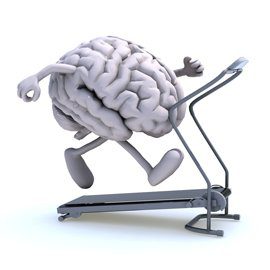 We often treat our minds and bodies as two separate entities. To keep our minds strong, we read, learn new things and do intellectually-stimulating activities like brain teasers. To keep our bodies strong, we hit the gym or head out for a jog.
We often treat our minds and bodies as two separate entities. To keep our minds strong, we read, learn new things and do intellectually-stimulating activities like brain teasers. To keep our bodies strong, we hit the gym or head out for a jog.
However, this detached thinking has a flaw. Your brain is a part of your body after all, and things like exercise can have a significant impact on how well it functions.
In fact, studies show us that exercise may be even more beneficial to cognitive functioning than many activities that we consider mental workouts, like crossword puzzles. This means that exercising during your anti-aging program can be a great way to not only maintain a healthy body, but a healthy mind as well.
This Is Your Brain on Exercise
Many studies have demonstrated how influential physical activity can be on mental health. Exercising keeps the mind active, which can help you prevent memory loss, dementia and the decrease in mental acuity that often comes with age. Exercise may even be capable of slowing down the progression of serious disorders like Alzheimer’s disease.
In one study, researchers looked at how exercise affected the brains of 700 people in their early 70s. Those who exercised the most retained more overall brain mass, better neural connections in the brain and higher volumes of crucial thinking cells called grey matter. The study found no connection between brain health and intellectually or socially-engaging activities, though this may be due to the types of brain scans the researchers used so further research is being done.
Staying Active for Life
We’re not exactly sure why exercise helps our brains so much, but it may have to do with something our every body part sorely needs: oxygen. Exercise boosts the level of oxygen in the blood, and scientists think this may help to preserve the health of brain tissue.
Any kind of exercise will do this just as effectively—you don’t need to start bodybuilding or running marathons to keep your mind strong and healthy. Regardless of your age and fitness, you can protect your brain during anti-aging therapy with gentle activities like:
- Walking. Because you can pick your own pace and go as far as you like, this is a great cardiovascular activity for those who are relatively new to exercise. All you need to get started is a comfy pair of shoes. Start going on walks through your neighborhood every evening, or if you’re truly adventurous, head out to a local park for a hike through nature on a sunny afternoon.
- Yoga. Though the activity’s foreign words and unusual movements can be intimidating to beginners, anyone can do yoga, and practicing regularly will help you build strength and flexibility. Yoga also has stress-reducing attributes that can further help you safeguard your mind. Look for a beginner’s yoga class in your area with a good teacher who can guide you through this excellent workout.
Of course, you should ask your doctor before attempting any new work-out to be sure your body is ready for the challenge. But no matter how you choose to exercise during anti-aging therapy, try to keep yourself active every day—both your brain and body will benefit.





Leave A Comment